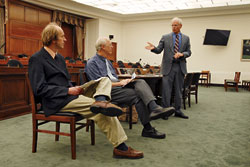 |
 Enlarge image
Enlarge image |
| From left, Michael Moore, Scott Kraus of the New England Aquarium, and Larry Madin at a Congressional briefing on research issues related to the survival of the North Atlantic right whale.
(Photo by Tom Kleindinst, WHOI) |
| |
| Related Links |
» Ocean Life Institute
» Liquid Jungle Lab
|
During 2005, The Ocean Life Institute (OLI) continued to foster
research and hardware development under three broad themes:
Discover Life, Sustain Ecosystems, and Develop Tools.
In 2005 OLI appointed three new Institute Fellows. Anne Cohen
works on understanding how corals build their skeletons, and
how climatic, environmental, and biological forces interact
to shape their growth and composition. She uses computerized
tomography scanning technology to quantify the impacts of
changing ocean temperature and chemistry on rates of carbonate
production by corals. Sonya Dyhrman is interested in how phytoplankton
respond to their geochemical environment. Her research uses
molecular tools to study the physiological ecology of different
phytoplankton groups. She is currently examining the genetic
capabilities that allow phytoplankton to respond to changes
in carbon dioxide, phosphorus, and nitrogen supply. Jesús
Pineda is working on the regional variability of populations
of sedentary animals like barnacles and mussels. He will be
investigating how ocean currents disperse and transport larvae,
the processes that determine which larvae survive to reproduce,
and the variability in different local populations.
Communication of research results and applications is an important
Ocean Institute function, and in 2005 we hosted one international
conference and two workshops. The International Invasive Sea
Squirts Conference in April attracted nearly 100 scientists
and managers to WHOI to explore the biology, ecology, impacts,
and control options for the invasive sea squirt species that
are causing serious problems in the Northeast and elsewhere.
The papers presented in this meeting will be published in
2006 as a special issue of the Journal of Experimental Marine
Biology and Ecology.
A second workshop on albatross population biology brought
international experts together in April to discuss their studies
of albatross demographic models. These mathematical representations
of population cycles are essential tools for conservation
of these endangered species.
In November, another workshop inaugurated the Reef Fish Connectivity
and Conservation Initiative. Focusing on the imperiled Nassau
Grouper in the Caribbean, this program will track connections
among larval and adult stages of the fish to address critical
conservation issues and help developing countries manage their
coral reef resources sustainably.
In addition to 10 individual OLI research grants awarded in
2005, the new Tropical Research Initiative provided support
for multidisciplinary research and technological advances
in tropical regions around the world. Five grants were awarded
through this initiative in 2005. Two of these projects will
be based at the Liquid Jungle Lab in Panama, where OLI and
WHOI continue to participate in the growth of this new field
laboratory.
—Laurence Madin, Institute Director
|

